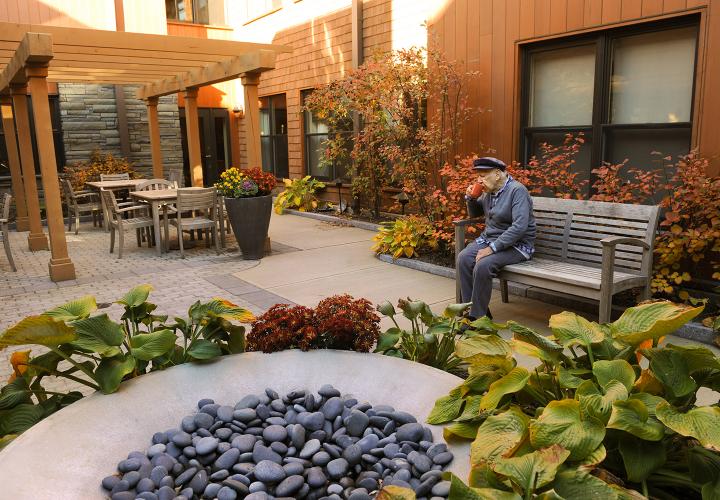Trusted Charlotte Memory Care: Professional Support for Your Loved Ones
Wiki Article
Developing a Safe and Encouraging Atmosphere: In-Home Memory Care Fundamentals
Establishing a caring and safe and secure setting for people needing at home memory care is paramount to their wellness and quality of life. From making sure safety within the home to utilizing reliable communication strategies and carrying out memory-friendly style components, there are vital parts that contribute to an alternative treatment technique. By concentrating on developing a helpful community that satisfies the distinct demands of those with memory disabilities, caregivers can dramatically enhance the day-to-day experiences of their enjoyed ones.
Safe Living Setting
When providing in-home memory care for people with cognitive problems,Creating a safe and hazard-free living atmosphere is vital. Making certain the safety of the specific with amnesia is essential to stop accidents and advertise a feeling of health. One necessary element of producing a safe living setting is to eliminate any possible hazards that might cause slips, trips, or drops. This consists of safeguarding loosened carpets, ensuring ample lighting in all areas of the home, and maintaining paths clear of clutter.Furthermore, making use of technology such as activity sensors and alarms can notify caretakers if the individual wanders or is in distress. By prioritizing safety and security measures and removing possible threats, caretakers can provide a protected and helpful setting for individuals with cognitive impairments getting at home memory care.
Effective Communication Techniques
Carrying out customized communication approaches is essential in cultivating significant communications with individuals with cognitive impairments in the context of in-home memory care. Effective communication plays an important function in creating an encouraging environment that boosts the well-being and lifestyle for individuals with memory issues. When connecting with somebody experiencing cognitive decrease, it is necessary to use simple and clear language, maintain a calmness and favorable tone, and give aesthetic signs to help understanding.One key approach is to practice energetic listening, revealing empathy, perseverance, and regard during discussions. Non-verbal signs such as faces and body language can likewise assist communicate understanding and assistance. In addition, making use of reminiscence treatment by using or discussing previous experiences music and art can take advantage of long-lasting memories, stimulating connections and boosting involvement.
Furthermore, incorporating regular regimens and consistent interaction patterns can give a feeling of knowledge and protection for people with memory disabilities. By carrying out these interaction methods, caretakers can develop purposeful connections and promote a feeling of convenience and count on the in-home memory care setting.
Memory-Friendly Design
Given the relevance of creating an encouraging atmosphere for people with memory issues via efficient interaction methods, the unification of memory-friendly layout aspects in the home ends up being necessary in maximizing their daily experiences and general health. Memory-friendly style concentrates on boosting safety, comfort, and freedom for people with cognitive disabilities. Easy alterations can make a substantial difference, such as utilizing contrasting colors to improve presence and reduce complication, including clear signage to help navigating, and decreasing clutter to avoid sensory overload.
Incorporating familiar aspects from the person's past, such as individual photos or favorite products, can stimulate positive memories and produce a feeling of experience. By incorporating these memory-friendly next layout aspects, caregivers can offer a encouraging and risk-free living room that enables individuals with memory concerns to maintain their self-reliance and quality of life. Charlotte Memory Care.
Daily Routine Preparation
When developing a daily regimen for individuals with memory issues, mindful planning is necessary to sustain their cognitive feature and total health. Establishing a structured routine can help in reducing anxiety, disorientation, and complication frequently experienced by those with memory disabilities. Begin by incorporating familiar tasks that line up with the individual's rate of interests and choices. Consistency in daily regimens can provide a feeling of protection and stability, helping in the conservation of cognitive capacities.It is crucial to allow adequate time for each task, minimizing the requirement to rush and preventing possible aggravation. Basic jobs like dish times, individual care, drug administration, and physical exercise must be incorporated right into the routine. Additionally, integrating regular periods of rest and relaxation can protect against fatigue and agitation. Flexibility is key, as some days may call for modifications published here based upon the individual's state of mind and energy degrees. Routinely assessing and adapting the everyday schedule will aid guarantee its performance in promoting a soothing and favorable environment for people with memory challenges.
Support System Implementation
Developing a robust network of supportive people plays an essential role in enhancing the top quality of care and wellness for people needing memory support. Family participants, buddies, medical care specialists, and community resources can all add to developing a strong support group. Interaction among these individuals is important to ensure that the requirements of the specific with memory difficulties are satisfied efficiently.Family participants are often the wikipedia reference key caretakers and form the foundation of the support group. They offer everyday treatment, psychological assistance, and companionship. It is crucial for member of the family to seek support and reprieve when required to avoid exhaustion and ensure the finest possible take care of their enjoyed one.
In addition to household assistance, including healthcare professionals such as specialists, registered nurses, and physicians can provide customized treatment and advice. These specialists can offer important understandings, medical suggestions, and assistance in handling the individual's problem.

Verdict
Finally, creating a encouraging and safe environment for individuals with memory treatment needs is essential for their wellness. By developing a risk-free living atmosphere, using efficient communication approaches, integrating memory-friendly layout elements, preparing day-to-day regimens, and carrying out a strong assistance system, caretakers can assist improve the lifestyle for those with amnesia. These crucial components interact to produce a nurturing and empowering environment that promotes freedom and enhances overall high quality of life.Creating a hazard-free and safe and secure living environment is vital when offering at home memory treatment for people with cognitive problems. By focusing on safety and security procedures and eliminating prospective risks, caregivers can offer a safe and helpful setting for people with cognitive disabilities getting at home memory treatment.
Establishing a robust network of helpful people plays a pivotal duty in boosting the top quality of care and health for people calling for memory support - Charlotte Memory Care. Interaction amongst these people is important to make certain that the demands of the specific with memory difficulties are fulfilled successfully

Report this wiki page